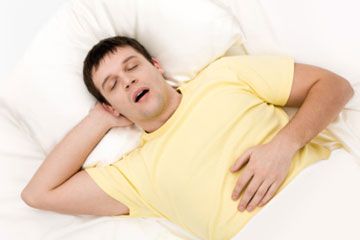While many of us think of sleep as a largely forgotten stretch of time when nothing happens, sleep is, neurologically speaking at least, a busy time indeed. Although sleep's importance is inarguable, scientists do not know exactly why it is so important to our survival. What happens when we sleep?
Sleep Stages
Scientists recognize sleep stages by tracking the changes in brain waves. The five sleep stages are repeated as many as five times during the night. As the night progresses, each cycle lengthens, and REM sleep, during which most dreaming takes place, extends.
Advertisement
- Sleep Stage 1 In this brief stage, which may last only a few minutes, the body drifts to sleep. Brain waves are mostly high amplitude, slow waves and occasional alpha waves (like those found when awake). Percent of total sleep time for young adults: 5 percent.
- Sleep Stage 2 Heartbeat and breathing slow and the sleep is deeper than in Stage 1. Slow-wave sleep continues with peaks of brain waves (known as sleep spindles) occurring. Percent of total sleep time for young adults: 44 to 55 percent.
- Sleep Stages 3 and 4 These are the stages of deepest sleep, when brain waves are slowest. During these stages breathing and heartbeat slow further and muscles relax. Dreams are more common than in the earlier stages and sleepwalking and talking may occur during Stages 3 and 4. Percent of total sleep time for young adults: 15 to 23 percent.
- REM Rapid eye movement (REM) sleep stages lengthen through the night. The first REM cycle may be only 10 minutes while the last could last as long as an hour. During this cycle the heartbeat increases, breathing becomes shallow, eyes move rapidly, muscles are relaxed, and dreams are most vivid. Brain waves resemble those during waking. Percent of total sleep time for young adults: 20 to 25 percent.
Why Do We Sleep?
Sleep is essential to life. Laboratory animals deprived of sleep die. And humans don't seem to be immune to the life-threatening effects of sleeplessness. A survey conducted by the American Cancer Society concluded that people who sleep 6 hours or less per night, or who sleep 9 hours or more, had a death rate 30 percent higher than those who regularly slept 7 to 8 hours. Even those who slept 6 hours or less who otherwise had no health problems had death rates 1.8 times higher than those who slept "normal" hours.
Advertisement
